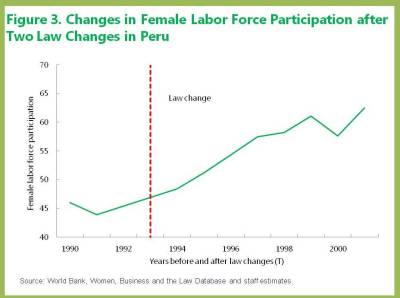Why everyone benefits from making the law fair for women


Get involved with our crowdsourced digital platform to deliver impact at scale
Stay up to date:
Gender Inequality
Leveling the legal playing field for women holds real promise for the world—in both human and economic terms. Unfortunately, that promise remains largely ignored and its potential untapped. In too many countries, too many legal restrictions conspire against women to be economically active—to work.
What can be done to remove these barriers? A new study done by IMF economists seeks to answer that question.
The bottom line? It’s about a fair, level playing field.
We can all do better
Despite some progress over the past few years, gender-based legal restrictionsremain significant. Almost 90 percent of countries have at least one important restriction in the books, and some have many.
These range from the requirement for women to seek their husband’s permission to work, to laws that restrict women’s participation in specific professions. Others constrain the ability of women to own property, or to inherit, or to obtain a loan.
Ties that bind
Our new study finds a strong relationship between legal restrictions and female labor market participation. In 50 percent of the countries studied, equity was reflected in law. When this happened, female labor participation rates increased by at least 5 percentage points over the following five years.
Think about the tremendous potential here. Countries ranging from Kenya and Namibia to Peru have made legal changes and reaped the benefits. Sometime all it takes is just a couple of laws to change.
Peru is a great example. In 1993, the new constitution granted equality between men and women under the law, and it eliminated discrimination by guaranteeing equal opportunities for work. Customary law (that is, traditional rules of practice) was invalidated if it contradicted these rights. Concurrently, as a result, women’s labor force participation increased by a striking 15 percent.
Other factors also play a role, of course. Demographics, education, and policies that include the provision of child care and maternity leave benefits all help boost female labor participation.
But legal rights are fundamental.
Leveling the playing field
There are big differences across the globe in female labor force participation. Women make up 40 percent of the global labor force. Yet only 21 percent of women in the Middle East and North Africa work outside the home versus 63 percent in East Asia, the Pacific and sub-Saharan Africa.
Given these very different circumstances, there is no single solution to the gender gap problems. We need a multi-pronged approach—one that is tailored to the country’s conditions, and social and religious norms.
But in any event, to bring more women into the workforce and increase growth, we need to level the playing field—eliminate legal discrimination against women. Removing legal restrictions can yield fast results in boosting female labor supply.
Increasing women’s economic participation can, in turn, lead to higher growth. By some estimates, raising female labor force participation to the respective levels of men would increase GDP by 5 percent in the United States, 9 percent in Japan, 12 percent in the United Arab Emirates, and 34 percent in Egypt. It makes economic sense to increase women’s labor participation.
Our study also finds that the introduction of more equity in property rights or in the pursuit of a job or a profession does not have to come at the expense of male employment. This can be a win-win outcome.
So what are we doing about it?
The IMF looks at these issues mainly through the economic prism of greater gender equality. We are contributing to this agenda through analytical work and regular health checks—known as Article IV consultations—with each of our member countries. What we find is that issues related to women’s participation in the labor force have important economic consequences, particularly in countries where there is a need to find new sources of growth, for instance where populations are aging rapidly.
Clearly, there is still a lot of work to be done but having more equal laws and regulations is a good place to start. By helping women reach their full economic potential, we can also help boost growth, prosperity and stability for the whole world.
In a world in search of growth, women will help find it, if they face a level playing field instead of an insidious conspiracy!
This article is published in collaboration with IMFDirect. Publication does not imply endorsement of views by the World Economic Forum.
To keep up with the Agenda subscribe to our weekly newsletter.
Author: Christine Lagarde is Managing Director of the International Monetary Fund.
Image: Colleagues talk outside of an office. REUTERS
Don't miss any update on this topic
Create a free account and access your personalized content collection with our latest publications and analyses.
License and Republishing
World Economic Forum articles may be republished in accordance with the Creative Commons Attribution-NonCommercial-NoDerivatives 4.0 International Public License, and in accordance with our Terms of Use.
The views expressed in this article are those of the author alone and not the World Economic Forum.
The Agenda Weekly
A weekly update of the most important issues driving the global agenda
You can unsubscribe at any time using the link in our emails. For more details, review our privacy policy.
More on Gender InequalitySee all
Claude Dyer and Vidhi Bhatia
April 18, 2024
Morgan Camp
April 9, 2024
Rida Tahir
April 9, 2024
Andrea Willige
April 8, 2024
Gilles Roucolle and Sumati Sharma
April 5, 2024









